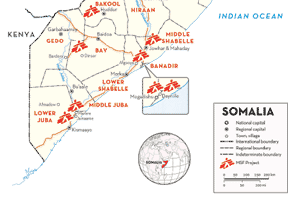As intense violence once again rocks Mogadishu, Somalia’s capital, teams from Doctors Without Borders/Médecins Sans Frontières (MSF) continue working throughout the country to provide lifesaving medical care.
Treating people injured in the fighting
In northern Mogadishu’s Daynile district, where MSF supports a community hospital, medical teams treated 218 people suffering from trauma injuries caused by shelling and gunshots between May 7 and 22. Of these, 81 were women and children. On May 14, MSF was forced to close its outpatient clinic in the Yaqshid district, also in northern Mogadishu, for two days to ensure its medical staff were not caught in the crossfire during the heavy fighting.
The clinic has now reopened and since May 7 staff have treated 14 people with trauma injuries. Nine patients were treated for gunshot wounds and five had additional injuries caused by shelling. Five of these patients were children, including one six-month-old baby. Another clinic in the Yaqshid area, located in Lido, has seen a sharp increase in activities as people have flooded into the area to try to escape the fighting. In the past two weeks, 22 people with trauma wounds have been treated there. The 50-bed inpatient ward in Lido has been packed, with an average admission of 120 patients per week. More than 1,200 outpatient consultations for children under five were carried out during the week ending on May 15.
Fear prevents people from seeking reproductive health care
In contrast, the number of consultations in MSF’s maternity and child care clinic in Jowhar, 90km (55 miles) north of the capital, actually decreased following fighting in the town on May 17, as people were too afraid to travel to MSF’s health centers. Admissions to the nutrition program decreased by 30 percent compared to the previous week. Some 40 percent less women were seen in the maternity clinic during the same period.
Increasing malnutrition levels
Many of those fleeing Mogadishu are seeking refuge in the area known as the Afgooye corridor, a stretch of road leading from the capital to the town of Afgooye, around 25km (15 miles) to the northwest of Mogadishu. Since 2007 MSF has worked in Afgooye, providing outpatient and nutritional care. On May 18, MSF teams distributed blankets, plastic sheeting, soap and buckets to 2,500 families who had recently arrived in Afgooye. MSF also supports a private clinic in nearby Hawa Abdi, which is about 15km (10 miles) from Mogadishu, and is working on building a permanent inpatient therapeutic feeding center, as the tents that were previously used have been badly damaged by rain.
Elsewhere in Somalia, MSF teams are seeing increasing numbers of children suffering from malnutrition. In Marere, in the Lower Juba region, admissions to the inpatient therapeutic feeding center, where patients are admitted when they need 24-hour care, have increased from 45 to 130 in May alone. Also in Lower Juba region, a further 400 children are being treated on an outpatient basis in nearby Jilib. In South Galcayo, admissions have also increased, with 75 patients currently receiving treatment in the inpatient therapeutic feeding center compared to a monthly average of 40. In North Galcayo, patient numbers have doubled since March and April, with around 300 children currently receiving treatment on an ambulatory basis and 40 children receiving inpatient care.
MSF treating and preventing measles outbreaks
Measles is also a concern. In Belet Weyne, which is in Hiraan region close to the border with Ethiopia, MSF teams started a measles vaccination campaign in mid-April, vaccinating 26,000 children between 6 months and 15 years old. However, cases have recently been detected in other areas of central Somalia: in Adado, Guri El, Dhusa Mareb, and Galcayo. MSF set up isolation centers: in March, medical staff treated five cases in South Galcayo; in April, 50 cases; and in May, 73. MSF will continue to monitor the situation closely.
MSF works in the Bakool, Banadir, Bay, Galgaduud, Hiraan, Lower Juba, Middle Shabelle, Lower Shabelle, and Mudug regions of Somalia. All MSF’s projects are currently run by Somali staff, supported by Nairobi-based international staff who visit whenever security allows.





